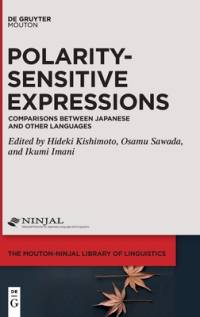Om Polarity-Sensitive Expressions
Polarity (positive, negative) is one of the most fundamental concepts in the system of language and there are many expressions that are sensitive to polarity. For example, any in English and wh-mo in Japanese appear in negative contexts, but not in positive contexts. While previous studies have shown that polarity-sensitive expressions are a general phenomenon in languages, it has also become clear that there are variations in polarity-sensitive expressions. This volume explores the variations in polarity-sensitive expressions through comparisons between Japanese and other languages, such as English, German, Spanish, and Old Japanese, and examines the environments and contexts in which polarity-sensitive expressions occur, as well as the types of (cross-linguistic) variation allowed. The value of the present volume lies in its inclusion of research papers inquiring into various types of polarity-sensitive expressions, such as negative-, positive-, and discourse-sensitive polarity items as well as their variations. The research indicates new directions for the study of polarity-sensitive expressions in the fields of syntax, semantics, pragmatics, historical linguistics, corpus linguistics and psycholinguistics.
Visa mer

